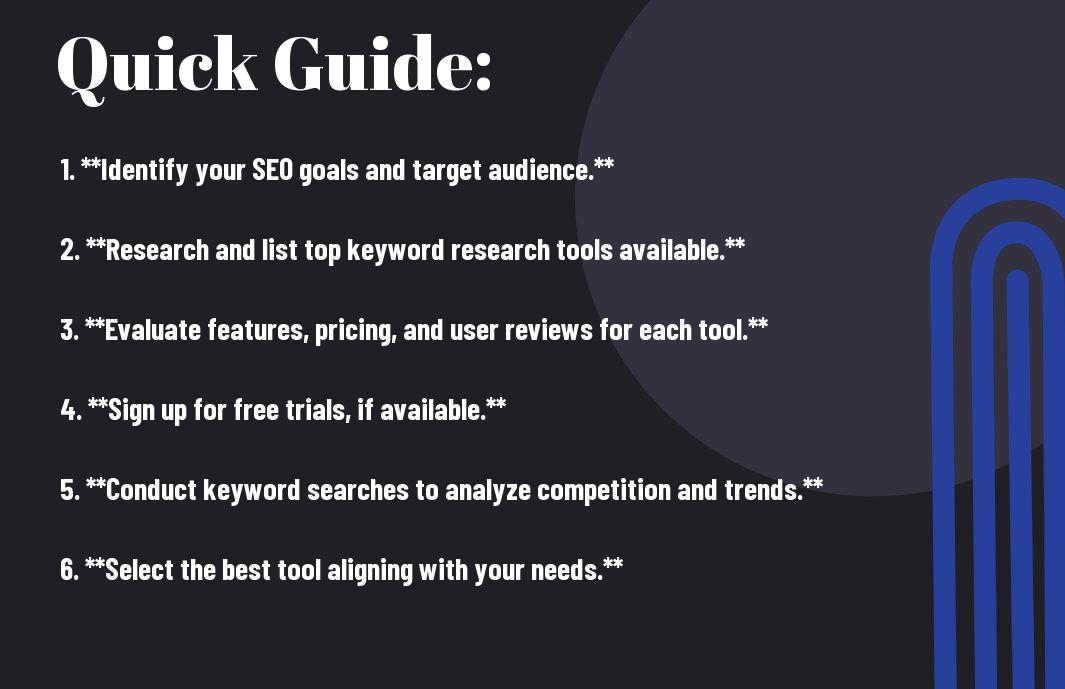Top 5 Keyword Research Tools for 2024
Unleash the power of data-driven SEO with the top 5 keyword research tools of 2024. Keyword research remains a cornerstone of successful digital marketing, and selecting the right tools is essential for driving organic traffic and outpacing competitors. Discover how to harness the potential of these cutting-edge platforms to unearth high-impact keywords, optimize your content, and dominate search engine results.

Top 5 Keyword Research Tools for 2024
One of the critical components of successful SEO is effective keyword research. With the rapid evolution of digital marketing, staying ahead of the curve requires using the right tools. Here’s a look at the 8 Top Keyword Research Tools for SEO in 2024 that can help you enhance your strategies and drive traffic to your site.
Tool 1: Google Keyword Planner
Overview:
As a cornerstone of Google’s advertising ecosystem, Keyword Planner offers a basic yet effective approach to keyword research. While primarily designed for Google Ads campaigns, it provides valuable insights for organic SEO as well.
Features:
- Keyword Suggestions: Provides a list of potential keywords based on a seed keyword or website URL.
- Search Volume: Offers estimates of monthly search volume for specific keywords.
- Competition: Provides insights into the competitiveness of keywords, although information can be limited.
- Ad Group Ideas: Suggests ad groups based on your keyword list.
Pros:
- Free.
- Integrates seamlessly with Google Ads.
- Offers basic search volume data.
Cons:
- Limited keyword suggestions.
- Requires an AdWords account.
- Lacks advanced features.
Pricing:
Free with a Google Ads account. Try Now!!!
Tool 2: SEMrush
Overview:
A comprehensive digital marketing suite, SEMrush is a powerful tool for in-depth keyword research. It offers a wide range of features beyond keyword analysis, making it a popular choice for both SEO and PPC professionals.
Features:
- Keyword Magic Tool: Generates a vast list of keyword ideas based on a seed keyword.
- Keyword Difficulty: Estimates the difficulty of ranking for a specific keyword.
- Organic Traffic Insights: Provides data on competitors’ organic traffic sources.
- SERP Analysis: Analyzes search engine results pages to understand the competitive landscape.
- Backlink Analysis: Helps identify backlink opportunities.
Pros:
- Comprehensive toolset including keyword research.
- Competitor analysis, backlink analysis, and SEO audits.
- Offers in-depth data and insights.
Cons:
- Can be costly for small businesses.
- Requires a learning curve.
Pricing:
Starts at $119.95 per month. Try Now!!!
Tool 3: Ahrefs
Overview:
Renowned for its backlink analysis capabilities, Ahrefs is also a strong contender in the keyword research space. It offers a wealth of data and insights for SEO professionals.
Features:
- Keyword Explorer: Provides keyword suggestions, search volume, and difficulty metrics.
- SERP Keyword Explorer: Identifies keywords used by competitors on search engine results pages.
- Content Gap Analysis: Helps find content opportunities by comparing your website to competitors.
- Rank Tracker: Monitors your website’s rankings for specific keywords.
Pros:
- Industry-leading backlink analysis.
- Strong keyword research capabilities.
- Provides actionable insights.
Cons:
- Steeper learning curve compared to some tools.
- Pricing can be higher.
Pricing:
Starts at $99 per month. Try Now!!!
Tool 4: Moz Keyword Explorer
Overview:
A user-friendly tool from Moz, Keyword Explorer focuses on providing actionable keyword data and optimization advice.
Features:
- Keyword Suggestions: Generates keyword ideas based on a seed keyword.
- Keyword Difficulty: Estimates the difficulty of ranking for a keyword.
- SERP Analysis: Provides insights into the competitive landscape.
- Link Explorer: Offers backlink analysis and domain authority metrics.
Pros:
- User-friendly interface.
- Focuses on actionable keyword data
- offers domain authority and page authority metrics.
Cons:
Limited feature set compared to other comprehensive tools.
Pricing:
Starts at $99 per month. Try Now !!!
Tool 5: Keyword Tool Dominator
Overview:
A free keyword research tool that offers a vast database of keywords. While it lacks the sophistication of paid tools, it can be a good starting point for smaller businesses or those with limited budgets.
Features:
- Keyword Suggestions: Generates a large list of keyword ideas.
- Long-tail Keyword Suggestions: Identifies long-tail keyword variations.
- Google Autocomplete Suggestions: Provides keywords based on Google’s autocomplete feature.
- Related Keyword Suggestions: Offers keyword ideas related to your search term.
Pros:
- Free
- Vast keyword database
- Accessible to beginners.
Cons:
- Lacks advanced features
- Data accuracy can be inconsistent.
Pricing:
Free, with paid options for additional features. Try Now !!!
Key Factors to Consider When Choosing a Keyword Research Tool
Unlike choosing a random tool, selecting the right keyword research tool requires careful consideration of several key factors that can significantly impact your SEO strategy. Here are some critical elements you should evaluate:
- Ease of Use
- Data Accuracy
- Range of Features
- Integration Capabilities
- Customer Support
Knowing these factors will empower you to make an informed decision and enhance your keyword research effectiveness.
Ease of Use
Even the most advanced keyword research tools can become a barrier if they are not user-friendly. A tool that is intuitive and easy to navigate will allow you to focus on what really matters: finding the right keywords for your content.
Data Accuracy
Little value can be derived from inaccurate data, so your chosen tool must provide reliable keyword metrics. Accuracy directly influences the effectiveness of your SEO strategy, making this a crucial factor in your search.
It’s vital to assess how frequently a tool updates its data and the methodologies used to gather keyword metrics. Tools that utilize real-time data and have a reliable source for keyword trends will give you a significant edge, allowing you to target the most relevant terms for your audience and improve your website’s visibility.
Range of Features
The breadth of features offered by a keyword research tool should align with your specific needs. Assess whether the tool provides comprehensive keyword suggestions, competitive analysis, or even content optimization recommendations.
Plus, having additional features such as SERP analysis, website audits, and keyword tracking can save you time and improve your overall SEO efforts. The more capabilities the tool offers, the more valuable it will be in shaping a robust SEO strategy.
Integration Capabilities
The ability to integrate seamlessly with other tools in your digital marketing stack is vital for streamlined workflows. Check if the keyword research tool can connect with analytics platforms, content management systems, and social media tools you already use.
Factors such as compatibility with major platforms like Google Analytics, SEMrush, or WordPress can enhance your productivity and make it easier to implement your keyword insights. They will ensure that you can leverage keyword research effectively across all facets of your marketing efforts.
Customer Support
Clearly, having reliable customer support is vital, especially if you encounter issues while using the tool or need clarification on its features. Evaluate the available support options, such as live chat, email assistance, or an extensive knowledge base.
Another critical aspect to consider is the tool’s community and resources. Access to tutorials, forums, and user communities can enhance your experience, providing you with additional insights and best practices to maximize the effectiveness of your keyword research.
Tips for Effective Keyword Research
Keep these key strategies in mind to enhance your keyword research process:
- Stay updated on industry trends.
- Utilize various keyword tools for diverse insights.
- Group keywords based on user intent.
- Focus on long-tail keywords for specific traffic.
- Continuously refine your keyword list as you gather data.
Thou must remain patient and persistent, as effective keyword research can significantly impact your SEO success.
Understanding Your Audience
Research indicates that comprehending your audience’s preferences, needs, and pain points is important. Knowing who you are targeting helps you identify relevant keywords that resonate with them, leading to higher engagement and conversion rates.
Analyzing Competitor Keywords
Audience analysis can provide valuable insights into keywords your competitors are using effectively.
The process involves examining the keywords that are driving traffic to your competitor’s sites. Use tools like SEMrush or Ahrefs to uncover these keywords, as this information can direct you towards opportunities that you may have missed. Understanding these competitive keywords allows you to refine your own keyword strategy for optimal positioning in search engine results.
Using Google Trends for Insights
Effective keyword research also involves leveraging Google Trends to spot emerging trends and seasonal fluctuations in keyword popularity.
It helps you understand how search terms evolve over time, allowing you to align your content strategy with trending topics. By adjusting your focus based on Google Trends data, you can ensure that your content remains relevant and appeals to your audience at the right time, ultimately leading to better traffic and engagement.
Creating a Keyword List
Any solid keyword research begins with a well-structured keyword list that prioritizes the most relevant terms.
Keyword organization enables you to focus on specific themes or niches within your content strategy. Consider using spreadsheets or keyword research tools to categorize your keywords by search volume, competition, and user intent. A structured list not only helps in content planning but also guides on mapping keywords to relevant pages on your website.
Regularly Updating Your Keyword Strategy
Keywords evolve, which is why regularly updating your keyword strategy is important for sustained success.
Keyword performance should be monitored continuously, as audience behavior and industry trends may shift. By analyzing which keywords are driving traffic and which are underperforming, you can make informed adjustments to your content strategy. Keeping your keyword strategy current ensures that you capitalize on new opportunities and maintain a competitive edge in your niche.
Keyword adjustments can lead to better alignment with customer needs and improved visibility in search engine results, enhancing your overall SEO efforts.
Step-by-Step Guide to Utilizing Keyword Research Tools
Now that you understand the importance of keyword research, let’s explore how to effectively utilize these tools to maximize your SEO efforts. Follow this step-by-step guide to ensure you capture the most relevant keywords for your content strategy in 2024.
Key Steps to Effective Keyword Research
| Step 1: Setting Clear Goals for Your Research | Define what you want to achieve with your keyword research, such as driving traffic, increasing brand awareness, or improving conversions. |
| Step 2: Inputting Seed Keywords | Begin with a few core topics or keywords that are relevant to your niche to generate more keyword ideas. |
| Step 3: Analyzing Results and Metrics | Review the data provided by the tools to gauge search volume, competition, and related keywords. |
| Step 4: Prioritizing Keywords for Content Strategy | Select keywords based on their relevance and potential to drive results aligned with your goals. |
| Step 5: Tracking Performance Over Time | Monitor the performance of your chosen keywords to make necessary adjustments in your strategy. |
Setting Clear Goals for Your Research
The first step in your keyword research journey is to set specific goals. Clearly defined objectives help you identify what types of keywords will be most beneficial. Aim to determine whether you’re looking to enhance brand visibility, drive traffic, or achieve conversions. By having a clear vision, you can steer your keyword research accordingly.
Inputting Seed Keywords
There’s no better way to begin your keyword research than by inputting a handful of seed keywords. These foundational keywords represent the core topics related to your niche. Think of them as the starting point from which you can explore a wider array of related keywords and phrases.
Keywords that are specific to your business or niche will generate broader keyword ideas. Utilizing tools, you can input your seed keywords and generate long-tail variations, which often yield less competition and higher chances of ranking. This phase is crucial for opening avenues you may not have initially considered.
Analyzing Results and Metrics
On analyzing the results, you will be presented with numerous metrics that are vital for your decision-making. Take note of the search volume, competition levels, and keyword difficulty scores to assess the viability of each keyword. This information can significantly influence your content and marketing strategies.
It’s vital to focus on metrics relevant to your site’s goals. By cross-referencing several tools, you can get a well-rounded understanding of what keywords are worth your time. This not only aids in content creation but ensures you are targeting terms that resonate with your audience.
Prioritizing Keywords for Content Strategy
Goals should dictate your keyword prioritization. Evaluate which keywords and phrases align best with your objectives, whether increasing traffic, building authority, or driving sales. Prioritizing these keywords ensures you are investing your efforts in the most strategic areas.
Research will help you compare keywords against your goals, identifying high-potential opportunities. The key is to create a balanced mix of both short-tail and long-tail keywords. This strategy allows you to capture a broad audience while also targeting specific queries that can lead to conversions.
Tracking Performance Over Time
Analyzing your keyword strategy includes tracking performance over time. It’s vital to revisit your selected keywords regularly to see how they perform, ensuring your content remains relevant and effective in driving traffic.
Inputting this data into your overall digital marketing strategy will allow for real-time optimizations. By monitoring trends, you can adapt to changes in user behavior or search engine algorithms, keeping your SEO efforts aligned with the expectations of your audience.
For additional insights, check out 5 Free Keyword Research Tools Worth Checking Out In 2024.
General Insights on Tools Across the Board
Even with their various strengths and weaknesses, all keyword research tools play a vital role in enhancing your SEO strategy. Choosing the right tool requires understanding not only its features but also how it aligns with your unique goals.
Board your selection process by assessing what aspects matter most to you—whether it’s cost, features, or local SEO capabilities. A thorough evaluation will allow you to harness the power of these tools effectively and boost your online presence in 2024.
To wrap up
The top 5 keyword research tools for 2024 will empower you to enhance your SEO strategies, drive traffic, and connect with your target audience effectively. By leveraging these tools, you can uncover valuable insights into search trends and user intent, ensuring your content remains relevant and compelling. Remember that the right keywords can significantly impact your online visibility, so take the time to explore these options and find the best fit for your specific needs. Staying ahead in keyword research will ultimately lead to more successful digital marketing efforts.





